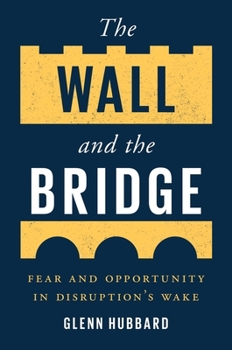The Wall and the Bridge: Fear and Opportunity in Disruption's Wake
Select Format
Select Condition 
Book Overview
An informed argument for an economic policy based on bridges of preparation and adaptation rather than walls of protection and exclusion
"When technological change and globalization in recent decades brought frustration over the resulting losses to jobs and communities, there were no guardrails to get these workers back on track. As this compelling book shows, our nation is going to need bridges to help people get through the unavoidable transformations."--Edmund Phelps, 2006 Nobel Laureate in Economics and author of Mass Flourishing Free-market economists often have noted that there are winners and losers in a competitive capitalist world. The question of how to deal with the difficult real-life consequences faced by the losers, however, has largely been ignored. Populist politicians have tried repeatedly to address the issue by creating walls--of both the physical and economic kinds--to insulate communities and keep competition at bay. While recognizing the broad emotional appeal of walls, economist Glenn Hubbard argues that because they delay needed adaptations to the ever-changing world, walls are essentially backward-looking and ultimately destined to fail. Taking Adam Smith's logic to Youngstown, Ohio, as a case study in economic disruption, Hubbard promotes the benefits of an open economy and creating bridges to support people in turbulent times so that they remain engaged and prepared to participate in, and reap the rewards of, a new economic landscape.
"When technological change and globalization in recent decades brought frustration over the resulting losses to jobs and communities, there were no guardrails to get these workers back on track. As this compelling book shows, our nation is going to need bridges to help people get through the unavoidable transformations."--Edmund Phelps, 2006 Nobel Laureate in Economics and author of Mass Flourishing Free-market economists often have noted that there are winners and losers in a competitive capitalist world. The question of how to deal with the difficult real-life consequences faced by the losers, however, has largely been ignored. Populist politicians have tried repeatedly to address the issue by creating walls--of both the physical and economic kinds--to insulate communities and keep competition at bay. While recognizing the broad emotional appeal of walls, economist Glenn Hubbard argues that because they delay needed adaptations to the ever-changing world, walls are essentially backward-looking and ultimately destined to fail. Taking Adam Smith's logic to Youngstown, Ohio, as a case study in economic disruption, Hubbard promotes the benefits of an open economy and creating bridges to support people in turbulent times so that they remain engaged and prepared to participate in, and reap the rewards of, a new economic landscape.
Format:Hardcover
Language:English
ISBN:0300259085
ISBN13:9780300259087
Release Date:January 2022
Publisher:Yale University Press
Length:248 Pages
Weight:0.95 lbs.
Dimensions:1.2" x 5.8" x 8.6"
Related Subjects
Business Business & Investing Economics Political Science Politics & Social SciencesCustomer Reviews
0 rating





